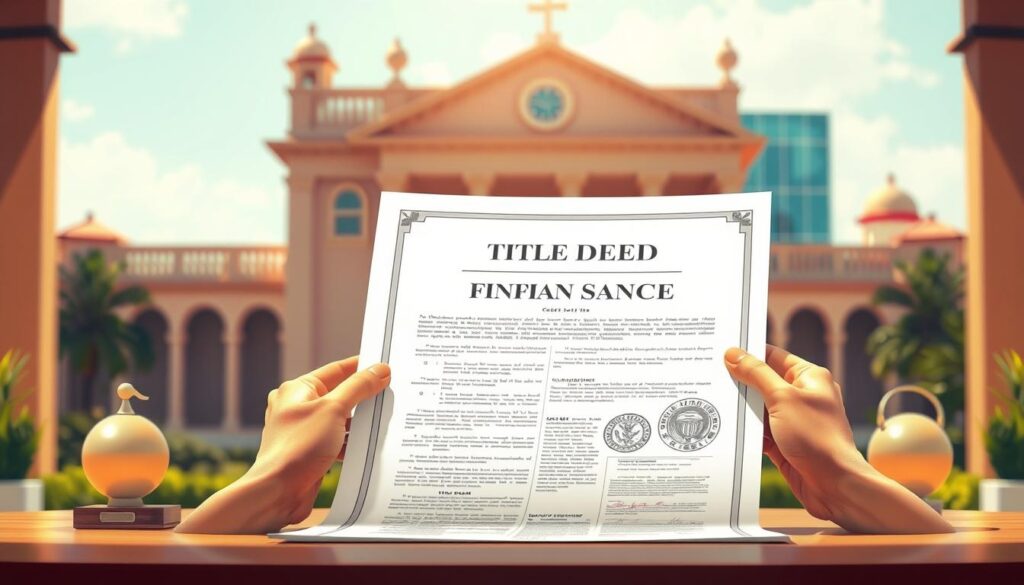When buying or selling a property in Florida, understanding title insurance is crucial. It’s a vital component of real estate transactions that protects both buyers and lenders from potential title issues that could arise after purchase.
The question of who pays for title insurance is often asked, and the answer varies by county, typically following local customs rather than being dictated by law. This variability underscores the importance of understanding the local practices and negotiating the payment responsibility between buyers and sellers.
As we explore the intricacies of title insurance and closing costs in Florida, we’ll provide a county-by-county breakdown to help buyers and sellers better prepare for the financial aspects of their transaction.
Key Takeaways
- Title insurance is a crucial component of real estate transactions in Florida.
- The payment responsibility for title insurance varies by county and is often a matter of local custom.
- Understanding title insurance can help buyers and sellers better prepare for closing costs.
- Title insurance protects both buyers and lenders from potential title issues.
- The payment responsibility can often be negotiated between buyers and sellers.
Understanding Title Insurance in Florida
In Florida, title insurance is an essential component of the homebuying process, safeguarding buyers and lenders from financial loss. Many lenders recognize the risk of title issues and require title insurance as a condition of the loan. As a buyer, it’s crucial to understand the different types of title insurance policies available.
What Is Title Insurance and Why It’s Important
Title insurance works as protection against issues like hidden heirs who may come forward to claim the property years after closing. According to industry experts, “Title insurance is a vital tool in protecting homeowners and lenders from unforeseen title defects.” Title insurance policies cover potential legal fees and overall save buyers and lenders from financial loss. By having title insurance, buyers can rest assured that their investment is protected.

Types of Title Insurance Policies in Florida
There are two primary types of title insurance policies available in Florida: owner’s policies and lender’s policies. Lender’s policies are typically required by mortgage companies as a condition of the loan, while owner’s policies are optional but highly recommended. The two policies work together to provide comprehensive protection for both the homebuyer and the lender. Lender’s policies last until the loan is paid off, while owner’s policies last as long as you or your heirs own the property. Some Florida homebuyers opt for enhanced title insurance options, which provide additional coverage beyond standard policies.
By understanding the different types of title insurance policies, buyers can make informed decisions about their investment. As the real estate market in Florida continues to evolve, it’s essential to stay informed about the importance of title insurance.
Who Pays for Title Insurance in Florida?
In Florida, determining who covers the cost of title insurance is an essential part of real estate transactions. The responsibility for paying for title insurance can vary depending on the county and the negotiations between the buyer and seller.
County-by-County Breakdown: Seller-Paid Counties
In some Florida counties, it is customary for the seller to pay for the owner’s title insurance policy. For instance, in counties like Miami-Dade and Broward, the seller typically covers this cost. However, it’s crucial to understand that these are just customs and not legally binding obligations.
| County | Typical Payment Responsibility |
|---|---|
| Miami-Dade | Seller |
| Broward | Seller |
| Hillsborough | Buyer |
County-by-County Breakdown: Buyer-Paid Counties
Conversely, in other counties, the buyer is usually expected to pay for the owner’s title insurance. For example, in Hillsborough County, the buyer typically bears this expense. It’s essential for buyers to factor this cost into their overall budget for the home purchase.
Negotiating Title Insurance Payment Responsibility
The payment for title insurance is negotiable between buyers and sellers. At the negotiation stage, buyers can ask sellers to consider paying for their owner’s title insurance policy. Negotiations can lead to various arrangements, including splitting the cost. Market conditions can influence negotiating leverage, and real estate agents can facilitate discussions to reach mutually beneficial agreements. In competitive markets, offering to pay for title insurance can strengthen a purchase offer.

Some key points to consider when negotiating title insurance payment include:
- Understanding local customs regarding title insurance payments
- Assessing market conditions to determine negotiating leverage
- Discussing title insurance costs alongside other closing costs
- Proposing alternative payment arrangements
By being informed and flexible, buyers and sellers can come to an agreement that works for both parties.
Title Insurance Costs and Calculation Methods
Title insurance costs in Florida are a one-time expense that provides long-term protection. When buying a home, understanding these costs is crucial for budgeting and financial planning. Unlike other insurance types, title insurance requires a single premium payment at closing, which is a significant aspect of the homebuying process.

How Title Insurance Rates Are Determined in Florida
In Florida, title insurance rates are determined based on the purchase price of the property. The state’s regulatory framework sets the premium rates, ensuring consistency across different title insurance providers. The rate is typically a percentage of the purchase price, making it a straightforward calculation for homebuyers to understand their title insurance costs.
The calculation method is designed to be transparent, allowing buyers to anticipate their expenses accurately. For instance, the premium for title insurance is usually paid at closing and is considered part of the overall insurance closing costs.
Additional Title-Related Expenses to Consider
Apart from the title insurance premium, there are other title-related expenses that homebuyers should be aware of. These may include costs associated with title searches, title examinations, and settlement or closing fees. Understanding these additional expenses helps buyers prepare for the total cost of ownership property.
- Title search fees
- Title examination fees
- Settlement or closing fees
Being aware of these costs can help homebuyers budget more effectively for their home purchase.
Title Insurance as a One-Time Investment
One of the significant advantages of title insurance is that it is a one-time investment. Unlike other types of insurance that require recurring premiums, title insurance provides protection for as long as you own the property, without any additional time-based costs. This aspect makes it a valuable investment for homeowners, providing peace of mind throughout their period of ownership property.
By paying title insurance once, homeowners can avoid potential legal and financial issues related to title disputes or defects, ensuring their right to the property.
Working with Title Companies in Florida
Navigating the complexities of Florida’s real estate transactions requires the expertise of a trustworthy title company. Title companies play a pivotal role in ensuring that the transfer of property is smooth and legally sound.

How to Choose a Reliable Title Company
Choosing the right title company in Florida involves considering several factors, including their experience, reputation, and the range of services they offer. A reliable title company will have a deep understanding of Florida’s real estate laws and regulations, ensuring that your transaction is handled efficiently.
It’s essential to research potential title companies, looking into their history, customer reviews, and the technology they use to facilitate the title search and insurance process. By doing so, you can ensure that your real estate transaction is in good hands.
What to Expect During the Title Insurance Process
The title insurance process in Florida involves several key steps, starting with the initial application and culminating in the issuance of the title insurance policy after closing. During this process, the title company will conduct a thorough title search to identify any potential issues with the property’s title.
Upon completing the title search, the title company will issue a title commitment or preliminary report, outlining the terms under which they are willing to issue the title insurance policy. This document is crucial for both buyers and sellers, as it highlights any title issues that need to be addressed before closing.
Conclusion
In conclusion, understanding title insurance in Florida is vital for both buyers and sellers. While customs vary by county, the responsibility for paying title insurance is ultimately negotiable between parties. It’s a one-time investment that provides long-term protection for property ownership. Working with a reputable title company ensures a smooth closing process. Buyers and sellers should discuss title insurance with their real estate agent early on to better prepare for closing costs. This essential protection provides peace of mind for what is often the largest investment most people make.
FAQ
What is the typical cost of title insurance in a real estate transaction in Florida?
The cost of title insurance in Florida varies depending on the purchase price of the property and the county where the property is located. I can expect to pay a certain percentage of the purchase price, which can range from 0.5% to 1% of the total amount.
How is the cost of title insurance calculated in Florida?
The cost of title insurance is typically calculated based on the purchase price of the property. The rate is usually a percentage of the purchase price, and it’s determined by the state of Florida. I should check with my title company to determine the exact cost.
Can the seller and buyer negotiate who pays for title insurance in Florida?
Yes, the seller and buyer can negotiate who pays for title insurance in Florida. In some counties, the seller is responsible for paying for title insurance, while in others, the buyer is responsible. I can review my contract to determine the terms of the agreement.
What is the difference between owner’s title insurance and lender’s title insurance?
Owner’s title insurance protects my ownership rights as a homeowner, while lender’s title insurance protects the lender’s interest in the property. I may need to purchase both types of insurance to ensure I’m fully protected.
How long does the title insurance process typically take in Florida?
The title insurance process typically takes several weeks to complete, depending on the complexity of the transaction and the efficiency of the title company. I should work closely with my title company to ensure a smooth transaction.
What services are included in the cost of title insurance in Florida?
The cost of title insurance in Florida typically includes a title search, title examination, and the issuance of title insurance policies. I may also need to pay for additional services, such as title insurance endorsements or title curative work.





